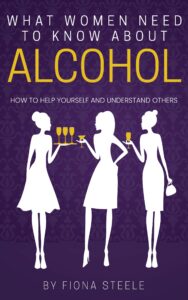You have just released a book, can you tell us a bit about it?
“My book “What women need to know about alcohol: how to help yourself and understand others” was written as a culmination of what I’ve been doing for the last 20 years. I have been working a lot of one-to-one and group work and training practitioners. I also just completed my masters last year, so I just thought, ‘what is a good way of getting all this knowledge together?’
Just as the names says, this is a real overview of everything you need to know. It’s not directive, it is non-judgemental it’s just giving people the information and the insight into making decisions if they want to.”

What issues do you cover that are specific to women?
“A lot of people are not aware that alcohol can impact on women physically and emotionally more severely than men given the same sort of drinking.
We have a saturation of alcohol in our society, it is offered to us as a fast-fix antidote to everything, and I think that culturally women have embraced that in several ways. We are seeing more and more women suffering from alcohol problems, and as you know, women are less likely to go to alcohol treatment services than men for many different reasons.
There’s a chapter on family issues; part of the work I did before was in supporting family members, so I have done a lot of work with the five-step method and other methods like that.”
What first made you think about doing a master’s in addiction?
“I’d been thinking about onward study for years, I did social work about ten years ago, and then I realised that it was addictions rather than family work that I wanted to do. I started working for a charity that specialised in drug and alcohol support and I ended up training a lot of professionals and I found myself a bit intimidated. So that was part of it as well to get the master’s behind me to have the authority and to help develop that position.”
Did you enjoy doing the master’s degree?
“Yeah, I loved it, it was great, brilliant. I did the online course at Middlesex and that worked really well. Middlesex offered everything I wanted in a master’s programme, particularly with the European element of it. I liked the idea of all the universities studying together across Europe, that really appealed to me.
I could never have afforded it if I hadn’t got the support from the SSA. I was working part time, but I didn’t have the money, so I had to go back to work and that was tough.
I was lucky to have the opportunity to go out to Spain to a friend’s house in the mountains for a couple of months. So yeah, packed up the car and the dog and went off to Spain for a couple of months to write up my dissertation. Then my friend was all like ‘you need to carry on and write a book here’, and I was like ‘you know what, I actually do know quite a lot about alcohol’ and I have a different perspective than a lot of people because I’ve been working and training and I have my own experiences as well.”
Fiona Steele has 20 years’ experience working in addiction and completed her master’s at Middlesex university in Comparative Drug and Alcohol Studies
The opinions expressed in this blog reflect the views of the author(s) and do not necessarily represent the opinions or official positions of the Society for the Study of Addiction.
The SSA does not endorse nor guarantee the accuracy of the information in external sources or links, and accepts no responsibility or liability for any consequences arising from the use of such information

